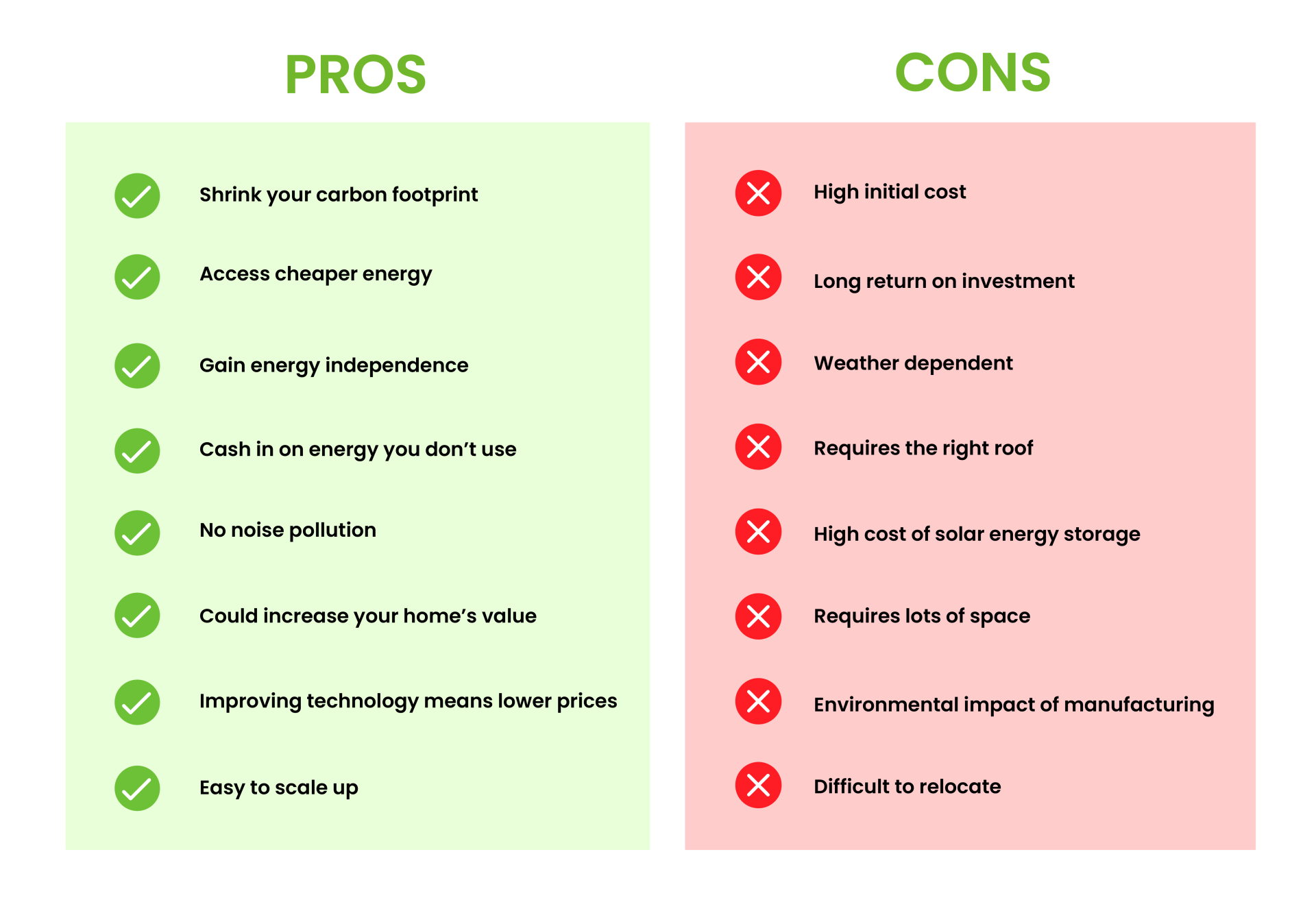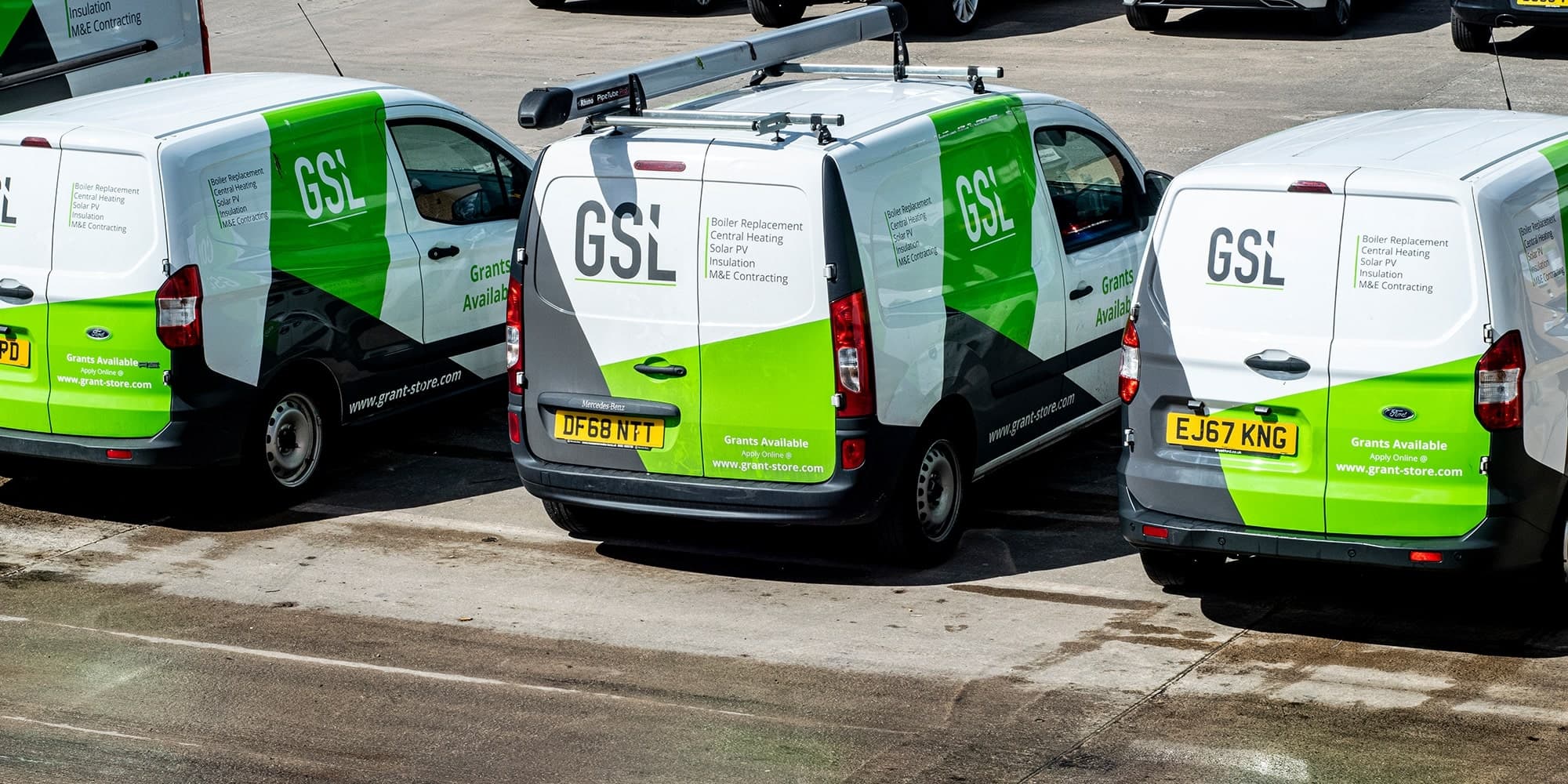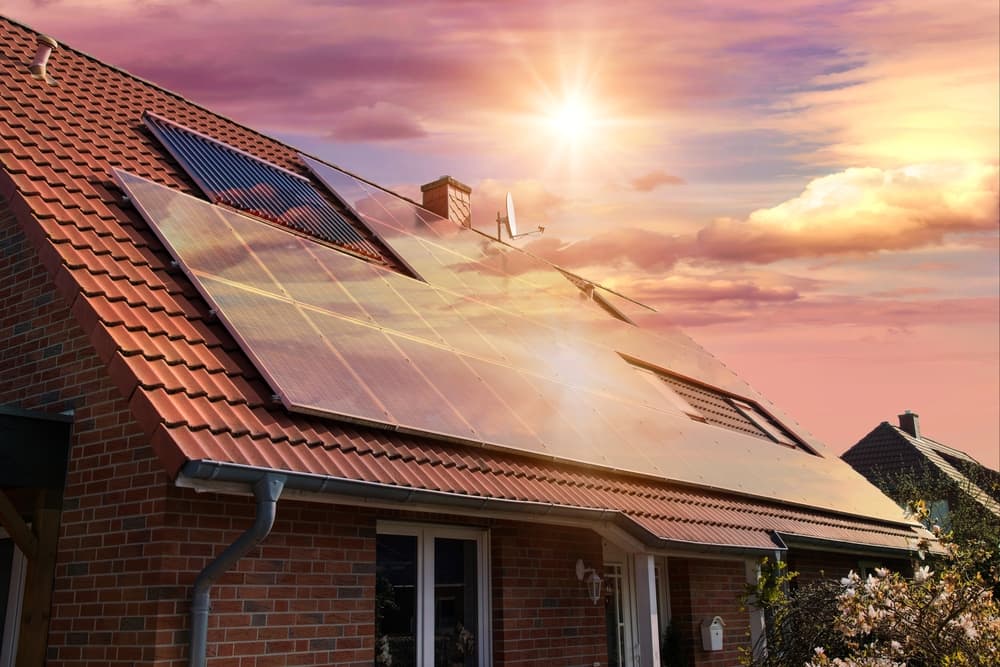June 9th, 2025
Solar water heating vs solar PV: What’s right for you?
Written by: Gareth Whitehill
News
Are you thinking about getting solar panels on your home but want to know the pros and cons more clearly? You’re in the right place.
Solar panel installations are a great investment for many households in the UK. However, they come with some important considerations to keep in mind.
In this Grant Store blog post, we’ll explore the benefits and drawbacks of solar panels to help you see if it’s worth your time, money, and effort.
This guide covers:

Let’s start with the advantages of solar panels, shall we? As one of the leading solar panel installers in the UK, we believe there’s a lot to say about them.
In addition to their sustainability factor, solar panel installations can also offer major cost savings on electricity bills.
But how?
Our homes tend to rely solely on electricity from the grid, which is connected to non-renewable energy sources like coal power plants.
But with solar panels, you have your own mini power plant on your roof, capturing and converting daylight into electricity, which powers your home with clean, sustainable energy.
With all this electricity being converted from daylight, you can reduce your reliance on the grid and your monthly energy bills!
This is especially helpful because traditional grid-supplied electricity is known to increase steadily over time. By generating your own solar energy, you’re not tied down to these unpredictable, increasing costs.
Are you interested in how much you could save with solar panel installation?
Our handy solar panel calculator can help you see the potential savings for yourself.
Another big benefit of solar energy is the fact that it is fully renewable and lowers your dependence on traditional fossil fuels.
A 2023 survey from the Department of Business, Energy, and Industrial Strategy (BEIS) found that over 80% of respondents were worried about climate change. With such a high number concerned for the planet’s future health, it’s clear that a solution needs to be found. Solar panels can be a big part of this, helping lower the dependence on non-renewable fossil fuels that cause the most damage.
The financial benefits of solar panels don’t end there. Did you know you could turn your solar system into a money-maker by selling excess electricity back to the grid?
The Smart Export Guarantee (SEG) was launched in 2020 and allows solar users to find the best rate for their excess electricity.
Your supplier will track your electricity exports through your smart meter and pay you according to their tariff—usually quarterly or annually.
Finally, solar panels can even increase the future value of your home. Since future buyers will be looking for ways to reduce their ongoing expenses, a home with solar panels that generates clean, cheaper energy will put a premium on your home.
Get a solar installation quoteAs you can see, there are plenty of reasons why a solar panel installation might be great for your wallet and the planet, but there are also some potential things to consider before investing.
In addition to the cost of the solar panels, you need an inverter to generate electricity and mounting equipment to secure the panels to your roof.
If you want to maximise your solar energy, you might even want additional battery storage for use off-grid, which can lead to a high upfront cost.
Fortunately, plenty of government grants, funding, and tax breaks for homeowners make solar panels cheaper and more financially accessible than ever, including the ECO4 grant scheme.
Explore the range of incentives and solar funding options with Grant Store here.
Solar panels are a great way to save money on your electricity bills, but depending on your rates, roof size, exposure to sunlight, and panel efficiency, the time it takes to see this return on investment can be several years.
This might not be ideal for homeowners who don’t plan on staying in their homes for the long term, though it’s possible that solar panels can improve a property’s perceived value, helping finalise a future sale more quickly.
We know – there’s a lot to consider, so don’t worry if you’re overwhelmed. If you’re considering installing solar panels for your home and think you could be eligible for funding but don’t know where to look first, we’ve got you covered.
Get in touch today, and we’ll let you know if solar energy is the best option for your home. If not, let’s see what other clean home heating options are available to you—we’ll even apply for and handle the full installation if you find your perfect solution.
June 9th, 2025
Solar water heating vs solar PV: What’s right for you?
Written by: Gareth Whitehill
News
May 9th, 2025
Solar panel installation: Step-by-step guide for UK homes & businesses
Written by: Gareth Whitehill
News
April 9th, 2025
Are solar batteries worth it in the UK?
Written by: Gareth Whitehill
News
April 9th, 2025
What size solar battery do I need?
Written by: Gareth Whitehill
News
January 20th, 2025
Heat pumps vs. traditional heating: Which is right for your home?
Written by: Gareth Whitehill
Heat Pumps
January 13th, 2025
Do heat pumps work well in older homes?
Written by: Gareth Whitehill
Heat Pumps
January 6th, 2025
How do air source heat pumps work?
Written by: Gareth Whitehill
Heat Pumps
December 30th, 2024
Are air source heat pumps worth it in the UK climate?
Written by: Gareth Whitehill
News
December 23rd, 2024
Why are heat pumps taking over UK homes?
Written by: Gareth Whitehill
Heat Pumps
December 16th, 2024
Are heat pumps suitable for smaller homes?
Written by: Gareth Whitehill
Heat Pumps
September 25th, 2024
Grant Store are official sponsors of Chorley FC!
Written by: Gareth Whitehill
News
August 30th, 2024
Grant Store is an official Octopus Trusted Partner!
Written by: Gareth Whitehill
News
August 1st, 2024
How green is solar energy?
Written by: Gareth Whitehill
Solar
July 30th, 2024
How to insulate an old house
Written by: Gareth Whitehill
News
July 29th, 2024
What’s Involved in an Air Source Heat Pump Installation?
Written by: Gareth Whitehill
Heat Pumps
July 28th, 2024
A complete guide to heating water with solar power
Written by: Gareth Whitehill
Solar
July 25th, 2024
How To Make the Most Out of ECO4 Funding
Written by: Gareth Whitehill
News
July 23rd, 2024
Are UK homes getting any greener?
Written by: Gareth Whitehill
News
June 27th, 2024
Why should you choose an MCS installer for your heat pump project?
Written by: Gareth Whitehill
Heat Pumps
June 27th, 2024
When does ECO4 end, and what happens next?
Written by: Gareth Whitehill
News
June 11th, 2024
Exploring Energy Grants for Pensioners: A Guide to Lowering Your Energy Costs
Written by: Gareth Whitehill
News
June 11th, 2024
Do air source heat pumps work well with solar panels?
Written by: Gareth Whitehill
Heat Pumps
June 11th, 2024
Your Guide to Understanding Energy Performance Certificates (EPCs)
Written by: Gareth Whitehill
News
June 11th, 2024
What energy grants can I get on Universal Credit?
Written by: Gareth Whitehill
News
June 1st, 2024
Who qualifies for a boiler grant in the UK?
Written by: Gareth Whitehill
News
May 22nd, 2024
Is the UK Government Planning to Ban Gas Energy?
Written by: Gareth Whitehill
News
April 25th, 2024
Your Complete Guide To Off-Gas Property Grants in the UK
Written by: Gareth Whitehill
News
April 24th, 2024
What are electric storage heaters?
Written by: Gareth Whitehill
News
April 23rd, 2024
How To Improve Your Home’s EPC Rating: A Guide to Boosting Efficiency and Reducing Costs
Written by: Gareth Whitehill
News
April 23rd, 2024
What is the ECO Scheme, and how can it help me?
Written by: Gareth Whitehill
News
April 23rd, 2024
How to apply for the ECO4 Grant: Everything you need to know
Written by: Gareth Whitehill
News
April 18th, 2024
The Complete Guide to Heat Pumps: Benefits, Costs, Savings, and Efficiency
Written by: Gareth Whitehill
Heat Pumps
March 13th, 2024
What size solar PV system do I need?
Written by: Gareth Whitehill
Solar
February 27th, 2024
What grants are available for energy-saving?
Written by: Gareth Whitehill
News
November 24th, 2023
How Many Solar Panels Do I Need?
Written by: Gareth Whitehill
Solar
November 23rd, 2023
How Much Money Do Solar Panels Save?
Written by: Gareth Whitehill
Solar
November 22nd, 2023
How Are Solar Panels Made?
Written by: Gareth Whitehill
News
November 22nd, 2023
Do you need planning permission for solar panels?
Written by: Gareth Whitehill
News
November 22nd, 2023
How Much Do Solar Panels Cost?
Written by: Gareth Whitehill
News
November 22nd, 2023
How Do Solar Panels Work?
Written by: Gareth Whitehill
News
November 20th, 2023
Smart Export Guarantee Rates 2024
Written by: Gareth Whitehill
News
November 20th, 2023
Can I Add a Battery to my Solar System?
Written by: Gareth Whitehill
News
November 20th, 2023
How Do You Store Solar Energy?
Written by: Gareth Whitehill
News
October 3rd, 2023
Solar panels: are they worth the cost?
Written by: Gareth Whitehill
News
September 19th, 2023
How efficient are solar panels?
Written by: Gareth Whitehill
News
September 19th, 2023
Do solar panels boost home value?
Written by: Gareth Whitehill
News
September 19th, 2023
What are the pros and cons of solar panels?
Written by: Gareth Whitehill
News
Not sure which energy-saving solution is right for your home? Or do you have questions about grant eligibility? Our team has the answers. Give us a call and we'll help you figure everything out.
Call us now on:
01942 918 844
"*" indicates required fields
